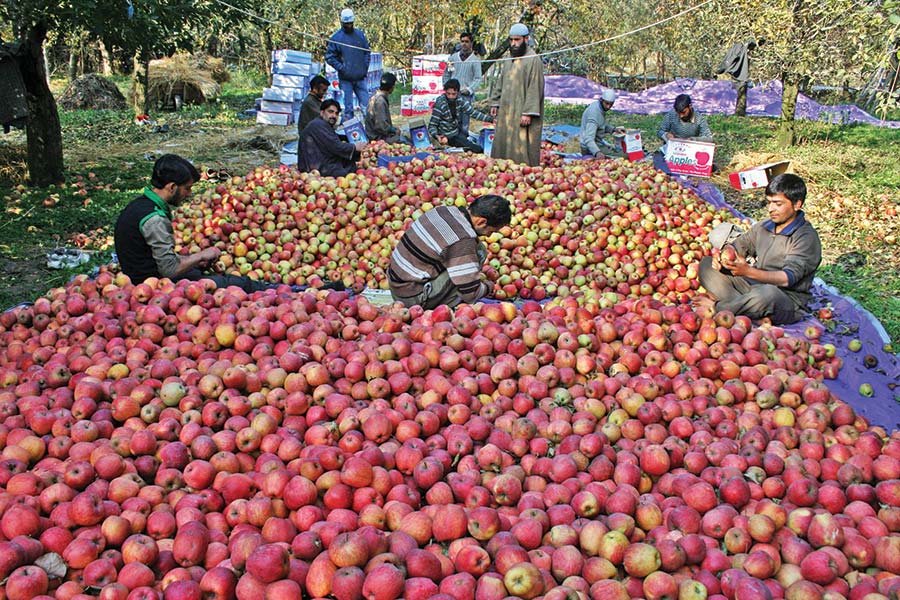
Recently several fruit growers from Himalayan states, particularly from Kashmir, expressed their serious concern and resentment at the slashing of additional duties on imports of apples, walnuts and almonds from the USA. As is well-known, the fruit growers in the USA have the benefit of several government subsidies and it is difficult to compete against them.
Now these worries may increase in view of additional imports. As Amar Ujala ( Himachal edition) reported on September 18 2023, much cheaper apple from Iran is likely to reach the Indian market in October. In addition there will be apples from Turkey too. After duties the imported apple will be still available at much below the local apple price, this report quoted grower representatives in Himachal as stating. In addition this report has also stated that several orchardists have not received their dues government from a long time; in most cases the dues goes back to about two years when a different government was in power.
This threat from increased imports has come at a time when Himalayan apple and other fruit or dry fruit growers have already suffered from adverse weather conditions. On the one hand there has been adverse impact on fruit growth. On the other hand, particularly in Himachal Pradesh, the road network has been badly damaged resulting in increasing problems in transport of apples and other fruits. During the previous season, trucks from Kashmir carrying apples could not reach big city markets in time leading to losses for growers. Too much delay can lead to the rotting of perishable fruits.
Last year ( 2022) on August 5 Himachal Pradesh had witnessed the biggest protest of apple growers in Himachal Pradesh in recent decades as a very large number of them joined a march in Shimla, following the getting together of nearly 27 of their organizations under the Sanyukta Kisan Manch ( SKM or Joint Farmers’ Front).This was the biggest protest of apple growers since 1990. Both of these protests were during the tenure of a BJP government.
This protest had raised a range of demands which were related to the growing problems of orchardists. One of the problems which came on top of other accumulating issues related to the rise in packaging costs and the raising of GST on packing materials. This protest criticized all-round increase in input costs and demanded more government help. Several demands relating to better price and marketing such as payment of minimum support price for various crops were raised. A Market Intervention Scheme for apples similar to the pattern of Kashmir was demanded, as also better implementation of agriculture produce marketing committee legislation.
Earlier the state government had facilitated the entry of big business interests in apple purchase by giving them quick NOCs and claimed that this will help to get higher price for apples. However this was soon followed by increasing problems of apple growers who complained that one of the big business houses was in fact responsible for setting a market trend towards lower price. Apple growers have been complaining that they get cheated in the arbitrary gradation of the farm produce as even better quality produce gets placed in a lower category leading to lower price.
A welcome development has been that the apple farmers of various Himalayan states have been getting united on the demand for significant increase of tariffs on imported apples so that Indian apple growers do not have to face unfair competition.
Some of the policies such as import of foreign plant material and varieties have led to losses as these could not grow properly. Indiscriminate sprays of pesticides and plant regulators have also led to ecological problems particular the disruption of natural pollination processes as bees, other friendly insects and birds who are natural pollinators have been harmed. Hence both the government as well as orchardists must give much more attention to ecological aspects in order to promote sustainable livelihoods related to orchards and horticulture in particular.
Apple orchards and other fruit orchards can be sustained in the longer term only if there is adequate protection of natural forests with their diverse local species so that overall biodiversity is maintained. Orchardists should grow a mix of fruits instead of concentrating mainly on apple. More of such fruit should be purchased by the state government for supplying to anganwadis and mid-day meals, instead of processing this into wine, so that the trend of converting high nutrition food into harmful products can be checked.
Clearly while it is important to provide immediate relief to apple growers, wider considerations of environment, sustainability and nutrition should also get the due attention.
Bharat Dogra is Honorary Convener, Campaign to Save Earth Only. His recent books include India’s Quest for Sustainable Farming and Healthy Food, Man over Machine and A Day in 2071.










































